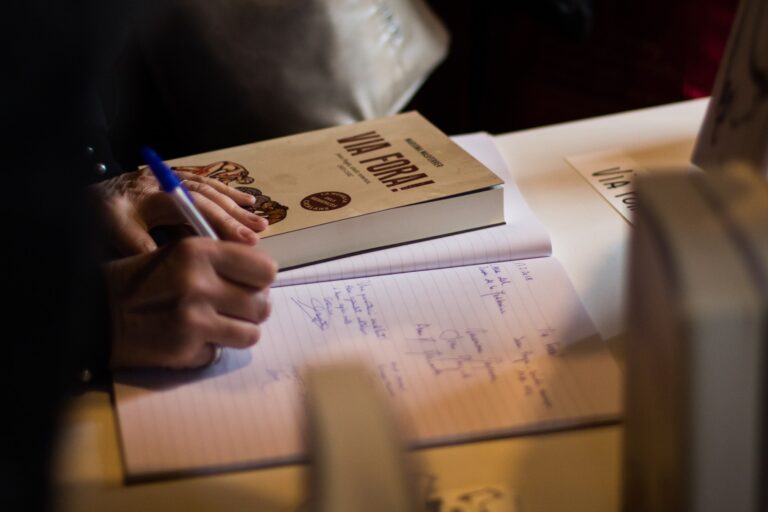How to Seduce Your Man if Your Man Is Michel de Montaigne
“I have just got back from 2 days in NYC. There is one advantage in it because although you see several people you wish you didn’t know, you see thousands you’re glad you don’t know.”
-Flannery O’Connor, The Habit of Being: Letters of Flannery O’Connor
New York City has as many events as event list-serves, and a person who subscribes to a bajillion of the latter can find ways to attend the former for a reduced rate, if not for free. Just such a person, I often attend these events alone, scribbling notes for whatever friends have regretted the loss of my company, somewhere swanky and somewhat free.
So it was that, not too recently, I found myself in a superb room at the New York Public Library after-hours. While waiting for a brilliant writer named Rebecca Mead to interview another brilliant writer named Sarah Bakewell about her book, How to Live: A Life of Montaigne, I jotted down nonsense. The fact that I had read neither Montaigne nor Bakewell did not strike me as a deterrent to enjoying the evening and, in fact, it did not.
Something else did. Something very unexpected.
My notes read, more or less, as follows: Waiting for Sarah Bakewell/Rebecca Mead event at NYPL to begin. Tix free… My eyes are so tired…There are some fancy pants in the room…Doubt I will see X here but it would be hilarious if I did…He has all but disappeared. Two weeks of telling me he was too busy and I stopped texting. Impulses wildly firing from hating him and his arrogance to thinking tenderly of his hair…It’s so dim and museum-like in here, I hope I don’t fall asleep. I would enjoy a drink…Maira Kalman! Love. Serve drinks, please, NYPL. Please. And then, a sudden switch to a frantic script: MARIJUANA. CIGARETTES. Some kind of body powder. I am allergic to people. Leather. Yes: right before the event began, the smell of marijuana and tobacco smoke as well as “some kind of body powder” AND leather sat next to me. X never appeared, incidentally, but surely I’d have embarrassed both of us because, in the next instant, I had a coughing fit. Instead of longing for X’s hair or alcohol, I longed for my inhaler. The couple who had sat beside me carried nearly a century of ash in their clothing: particles which rose when they sat, per that dual law of physics and free events.
Despite nearly dying, I managed to note a great deal about Sarah Bakewell and Montaigne, none of which I am going to relate here. (Though I do apologize sincerely if my coughing disturbed the speakers.) Okay, I will relate one thing: relevant to Montaigne’s invention of the essay was Bakewell’s expert description of him as “the patron saint of not getting to the point.” With Montaigne, the point is never the point, but rather, what occurs to him en route to the point—and that is why I love him.
The thing about falling in love with real people—people who are maybe arrogant but have excellent hair—is that you have to deal with the whole person. Falling in love with a writer from the sixteenth century—a bald one—can occur entirely on your own terms. You can read him whenever you want to, with the added bonus of being able to ignore what little you don’t love. His allure exists in opposite proportion to your capacity to run your fingers through his hair, which has not been on his head since 1565. Give or take a year.
Coughing up my lungs in that swanky room in the NYPL, I would have agreed wholeheartedly with Montaigne’s assertion that, for the “common run of bodies…the best state they can be in is to be free from odour.” For a mind like Montaigne’s of course crafted an essay called “On smells.” It is short, frank, and hilarious, and if it were not wrong to do so, I would copy the whole thing here. But that would definitely deter our passionate affair, as it was almost run off the rails by Montaigne’s reference to Plautus and his assertion that “a woman smells most perfectly when she does not smell at all, just as her deeds are said to smell sweetest when they are unnoticed and unheard.”
{GASP}
Montaigne’s relations with women have been analyzed by pens more adept than mine, but grant my boyfriend a few centuries’ margin of error as well as an independent mind—he does not give Plautus the final word on how women smell. No, Montaigne argues: ‘Yet I very much like to be regaled with good smells, and particularly loathe bad ones, which I can detect at a greater distance than anyone else: “For my nose is sharper, Polypus, at smelling the rank goat-smell of hairy armpits, than a dog at scenting out hidden game.”’ Neither Horace nor my beloved essayist likes goat-smells—adding to my ever-growing theory that writers are especially attuned to scent.
And that is where I run into trouble. I have to wonder what Montaigne would think about some of the scents in my collection. They are not all “good.” In fact, a number of them contain elements of the smells that nearly killed me that evening in the NYPL: tobacco, smoke, leather. One of my favorites is Trayee, by Neela Vermeire; its notes include “an arrestingly realistic ganja accord.” Another is by the Brooklyn company D.S. & Durga; the name is Sir, and the company site describes it as “animalic” and “masculine.” I bought it because it was the next-best-thing to one of their discontinued scents (if ANYONE has a bottle of East-Mideast, please message me!) and because one reviewer described it as something she wore out on nights she expected to be a bit naughty. Whenever I wear it, people come closer.
But what about my man Montaigne? Would he—if he could—come hither?
It is highly unlikely that his world of caps worn under hats and European bath houses (visited to cure his kidney stones, which they did not) smelled much like my world of deodorized everything and the American war against bacteria. I can only hope that what was a “good” scent in the sixteenth century matches what is now a naughty one, adept at luring in a worldly thinker with a clever pen who likes to smooch. For according to the man himself: “Whatever the odour, it is remarkable how it clings to me…in my case it is my moustache, which is thick, that performs that duty…It betrays the place where I have been. The close, luscious, greedy, long-drawn kisses of youth would adhere to it in the old days, and would remain for several hours afterwards.”
Ah, Montaigne—so close, so luscious. So ready to text back.


